
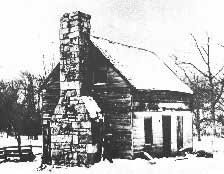 Meshach Browning (1781-1859) is known as Maryland's
greatest hunter. In his autobiography under the title of "Forty-four Years of
the Life of a Hunter" he has told wonderful and amazing stories of hunting in
the glades and mountains of what is now Garrett County, Maryland. (Note: This is
not the founder of Browning Gun Mfg.)
Meshach Browning (1781-1859) is known as Maryland's
greatest hunter. In his autobiography under the title of "Forty-four Years of
the Life of a Hunter" he has told wonderful and amazing stories of hunting in
the glades and mountains of what is now Garrett County, Maryland. (Note: This is
not the founder of Browning Gun Mfg.)
Meshach Browning bought and sold various parcels of land, moving several times, building cabins by hand, and training his sons in nature lore and hunting skills.
His cabin pictured her was built at Sang Run, a property now farmed by a great-grandson of the famous hunter and pioneer. Meshach also erected a gristmill on this location. The cabin, shown in the photograph, was still standing until fire destroyed it about the year 1933.
The remains of Meshach Browning's canoe, which he used in Hunting deer on Deep Creek have been preserved and provide an object of interest in the lake area of Garrett County. His famous rifle is on display in the Smithsonian Institution.
Historical Number - 1107
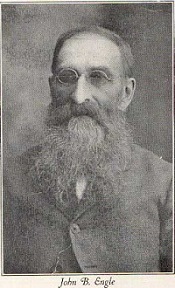 John B. Engle, son of Jeremiah Engle and grandson of Mortimer Engle,
the first of his family to cross the Alleghenies was born April 16, 1839. His
correct name was John J., but in order not to be confused with the “miller” John
J. Engle, he made the change as noted. He was confirmed at St. Paul’s in the
first class of Catechumens with the Wilhelms on October 27, 1860.He was married
December 30, 1860 to Elizabeth Tressler, who was confirmed into the fellowship
of St. Paul’s May 5, 1861. To this union nine children were born, all of whom
are living of whom six are members of this congregation. They are: Susan,
Jeremiah, Albert, Wilson, John, Theodore, Harvey, Elmer and Clara.
John B. Engle, son of Jeremiah Engle and grandson of Mortimer Engle,
the first of his family to cross the Alleghenies was born April 16, 1839. His
correct name was John J., but in order not to be confused with the “miller” John
J. Engle, he made the change as noted. He was confirmed at St. Paul’s in the
first class of Catechumens with the Wilhelms on October 27, 1860.He was married
December 30, 1860 to Elizabeth Tressler, who was confirmed into the fellowship
of St. Paul’s May 5, 1861. To this union nine children were born, all of whom
are living of whom six are members of this congregation. They are: Susan,
Jeremiah, Albert, Wilson, John, Theodore, Harvey, Elmer and Clara.
Mr. Engle served his country in the Civil War, being a member of Company H, First (Provost) Battalion, Pennsylvania Infantry. For a number of years, he was a member of the G. A. R
Mr. Engle died October 24, 1912 and on the 27th was interred in the Family Lot at St. Paul, Rev. E. S. Hassler officiating. Mrs. Engle died November 13, 1906 at the age of 67 years, four months and 19 days.
Josiah J. Engle, son of Jeremiah and Christina Engle, was born May 1, 1841. He attended public school in Elk Lick Township and followed the occupation of farming.After the death of Peter Wilhelm, he was the first man to occupy the Wilhelm Homestead, where he remained for thirteen years. He was a veteran of the Civil War, serving in the 154th Infantry. He held Township Offices, being Constable and Justice of the Peace. He served his Church, with which he united on May 5, 1861 as Elder and Deacon and for many years was the Sexton of the Church.
He was a merchant, and had a store in what was previously a Shoemaker Shop, located on the Southeast Corner of the Sexton Property. Later in life he conducted a store in Coal Run.
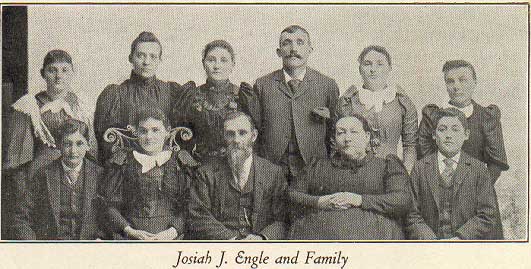 Mr. Engle was twice married, the latter time to Miss Malinda Folk, daughter of
Samuel Folk, and she was raised on the John D. Yoder farm. By his first marriage
he had the following children: Ellen, Harvey and Sallie; by his second marriage:
Mrs. Ida Opel, Russell J., Mrs. Alcinda Engle, Mrs. Annie Harding, Mrs. Savannah
Sipple, Melissa, Samuel J., George and two who died in Infancy.
Mr. Engle was twice married, the latter time to Miss Malinda Folk, daughter of
Samuel Folk, and she was raised on the John D. Yoder farm. By his first marriage
he had the following children: Ellen, Harvey and Sallie; by his second marriage:
Mrs. Ida Opel, Russell J., Mrs. Alcinda Engle, Mrs. Annie Harding, Mrs. Savannah
Sipple, Melissa, Samuel J., George and two who died in Infancy.
It is said of Mr. Engle that he was a kind to a fault. Tramps seemed to know that they would receive a welcome at his home. He was a strickler for that which he believed, his judgement was seldom faulty, his perceptions were quick and he was able to follow a train of argument from beginning to end without a hitch or break.
He died at his home where his son Samuel now lives, from Heart Failure, on November 16, 1906. The funeral service was conducted by Rev. S. C. Stover, assisted by Dr. L. P. Young.Mrs Engle died August 18, 1913. Both are interred at St. Paul’s.
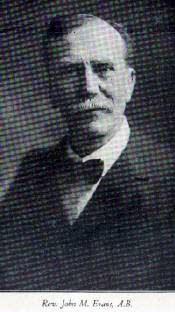 John Miles Evans, the youngest son of James G. and Rebecca
Kryder Evans, was born near Spring Mills, Center County, Pennsylvania, August 9,
1848. He attended Oley Academy at Friedensburg, under the principalship of his
brother, L. Keyder Evans, and later Penn Hall Academy, after which he taught,
schools and clerked in a store. He finished his preparatory studies at
Bellefonte Academy and entered the Sophomore class of Franklin and Marshall
College in 1872, graduating in 1875, as the valedictorian of his class. In the
fall of the same year, he entered the Seminary at Lancaster, graduating in 1878.
On January 7, 1879, he was ordained by West Susquehanna Classis and installed
pastor of the Curllsville Charge.
John Miles Evans, the youngest son of James G. and Rebecca
Kryder Evans, was born near Spring Mills, Center County, Pennsylvania, August 9,
1848. He attended Oley Academy at Friedensburg, under the principalship of his
brother, L. Keyder Evans, and later Penn Hall Academy, after which he taught,
schools and clerked in a store. He finished his preparatory studies at
Bellefonte Academy and entered the Sophomore class of Franklin and Marshall
College in 1872, graduating in 1875, as the valedictorian of his class. In the
fall of the same year, he entered the Seminary at Lancaster, graduating in 1878.
On January 7, 1879, he was ordained by West Susquehanna Classis and installed
pastor of the Curllsville Charge.
After a pastorate of six years in this field, he accepted a call to the Paradise Charge. The following April, he was married to Mrs. Ellella Bott Weller, Latrobe, Pennsylvania. Mrs Evans first was a graduate of Heidelberg University. Mr. Evans first met her at Clarion Collegiate Institute, Rimersburg, Pennsylvania, where she taught and was assistant principal to Prof. W. W. Deatrick, now professor in Keystone State Normal School at Kutztown, Pennsylvania.
Possessing most excellent qualities of heart and mind she was a most faithful and efficient co-worker with her husband. Another writing of her says: “She was an humble and faithful and zealous servant of the Loar; a faithful and devoted wife and a loving Christian Mother. Towards all she was considerate and kind. The affairs of the Church lay near to her heart.” In the Outlook of Missions for March 1915, a co-worker pays her the following tribute:
“Mrs. Evans was born leader and organizer. While an ardent advocate of Foreign Missions, her interest did not wane in the Home Field, but was a liberal supporter of both. A little more than thirty years ago, she was one of the noble women who organized the Woman’s Missionary Society of General Synod at Akron, Ohio, and was one of its Vice Presidents. Soon after she was one of the five or six women who met at Butler, to organize Pittsburg Synodical Society. She also wrote the first constitution of the Synodical Society. She was the prime mover in the organization of the Somerset Classical Society, and was its first President. The women of this Missionary Society, in appreciation and recognition of her efficient and loving service, have recently made a contribution in her name, which entitles it to be placed on the list of Members in Memoriam of the W. M. S. of General Synod. It was not an easy task to formulate plans for the organization of these societies at that period. It required firm faith, undaunted courage and ardent prayers. The women of that day were timid, ready to follow, but slow to lead”.
The Ellelia Bott Evans Church-Building Fund was given by the W. M. S. of Somerset Classis and the members of the Paradise Charge in memory of Mrs. Evans.
The division of the Charge was questioned that was debated for years. But just when and how seemed to be the difficult problem. The work in all the congregations had grown to such an extent that the Pastor and his wife felt that the time had come for a division of the field. At an annual meeting of the Joint Consistory the pastor presented the proposition of dividing the Charge so as to include one Pennsylvania and one Maryland Congregation in each Charge. The matter went over to a special meeting, when after a warm but friendly debate, a resolution was passed, providing for the division of the Charge as it now exists, which action was ratified by the Congregations, and a petition was sent to Classis, which was acted upon favorably. We share the opinion of the now sainted Elder Peter S. Hay, who repeatedly remarked in after years, that the division of the Charge was one of the best things done during our pastorate.
These were strenuous,
but happy years, until the shadow of death hovered over us. At this time the
health of Mrs. Evans was broken, and it was deemed best to leave the new Charge
in new Hands. The pastor was called to the Denmark-Manor Charge, Westmoreland
Classis. It was in this new home that Mrs. Evans passed to her eternal reward.
She left behind, and in great sorrow, a Husband and two Sons, James Wolf, aged
seven , and John Kryder, aged three. Both boys are graduates of Franklin and
Marshall College. James is superintending large oil refineries and oil
industries in Triniday Island. John is in business in Philadelphia. Our feelings
are beautifully expressed by the one who wrote: “Once on a Radiant Morning”
Once on a radiant morning
All on a summer’s day
My best love set forth
with me
Along the heart’s highway
The land was filled with sunshine
Because I loved her so
And all the world was good and fair
But that was
long ago
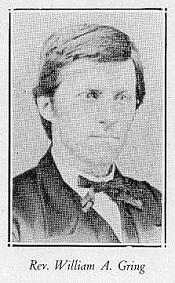 The interim between the pastorates of Dr. Koplin was filled in part by the pastorate
of Rev. W. A. Gring. While Mr. Gring was a man of good education and of
considerable ability, he failed to impress his people as did his predecessor,
Dr. Koplin. Perhaps his work was over-shadowed by the activities of the man who
had won the hearts of the Wilhelms. The records of the church are silent
concerning his work, and we are led to believe that it was largely of a routine
nature, a matter of holding the fort until the return of Dr. Koplin.
The interim between the pastorates of Dr. Koplin was filled in part by the pastorate
of Rev. W. A. Gring. While Mr. Gring was a man of good education and of
considerable ability, he failed to impress his people as did his predecessor,
Dr. Koplin. Perhaps his work was over-shadowed by the activities of the man who
had won the hearts of the Wilhelms. The records of the church are silent
concerning his work, and we are led to believe that it was largely of a routine
nature, a matter of holding the fort until the return of Dr. Koplin.
Rev. William A. Gring, son of Rev. Daniel and Catharine Gring, was born at Paradise, Northumberland County, Pennsylvania, January 12, 1838. When he was about fifteen years old, he removed with his parents to Shrewsbury, York County, where he was confirmed, May 6, 1854. He received his preparatory training at McEwensville, and Franklin and Marshall Academies. In 1856, he entered the Freshman class of Franklin and Marshall College and was graduated with his class in 1860.
Two years later, he completed the theological course at Mercersburg, and in October of the same year was licensed to preach by the Synod in session at Chambersburg. In 1863, he was commended by the Board of Visitors of the Theological Seminary and elected by the Synod as travelling fellow in accordance with the provision of the theological tutorship scheme. This honor he declined. He was ordained June 8, 1863.
The first Charge in which he labored was the Paradise Charge, known then as the Grantsville Charge, and his pastorate covered a period of two years and four months beginning in April 1863. From the Paradise Charge, he went to Harrisburg, where he had charge of a mission for over two years. We next find him located at Danville, where he was assistant to Rev. J. W. Steinmetz. Subsequently he served the Mount Moriah, Maryland, Charge for seven years, beginning in October 1869; the Sulphur Springs Mission in Bedford County, Pennsylvania, for five years; the Emmitsburg, Maryland, Charge from July 1881 for one year.
His health failing, he removed to Somerset
County, October 1, 1882, and engaged as agent for the White Bronze Statuary and
Monumental Works for two years. It was while thus employed that Rev. C. U.
Heilman met him one day and inquired if he were not going to attend a certain
meeting at Somerset, at which all the ministers of the Classis were expected to
be present. Mr. Gring replied that he was going after other business, adding:
“My work has not been acceptable unto the Lord, for he has silenced my voice”.
The monumental business being distasteful to him, he returned to Maryland in
October 1884 and located on a small farm about a mile from Frederick, where he
died of consumption, February 8, 1889. He lies buried in Mt. Olivet Cemetery,
Frederick.
Rev. Mr. Gring was married, November 20, 1873, to Miss Emma A. Stonebraker, and was the Father of two Daughters.
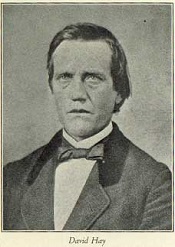 David Hay, one of the charter members of St. Paul’s congregation, was born in
Brothersvalley, September 3, 1814, and died at his home in Elk Lick Township,
April 14, 1878. He was a son of Peter S. and Elizabeth Hay. Prior to his
locating in Elk Lick Township, he operated a grist mill in Brothersvalley, and
also taught School.
David Hay, one of the charter members of St. Paul’s congregation, was born in
Brothersvalley, September 3, 1814, and died at his home in Elk Lick Township,
April 14, 1878. He was a son of Peter S. and Elizabeth Hay. Prior to his
locating in Elk Lick Township, he operated a grist mill in Brothersvalley, and
also taught School.
Mr. Hay was twice married. His first wife was Miss Polly Cook, who died in 1850. Two years later he married Mrs. Mary A. Boose. By his first marriage, he had two children: Wm. H. and Calvin T. Hay; by his second, one son, Norman D. Hay.
Mr. Hay was a friend of Education and served his community as School Director. He was a member of the State Assembly, being elected on the Whig Ticket in 1857. In politics he was a Democrat, and took an active part in advancing the interest of his party.
While Mr. Hay was active in various lines of activity, he was closely identified with the work of the Reformed Church all his life. He was the first Deacon of St. Paul’s, and for a number of years served as Elder. When the brick Church was built, he not only contributed $2,000 towards its erection, but he was Chairman of the Building Committee. Before his death, he requested that his heirs set apart $1,000 for a Poor Fund, which was done. He enjoyed the confidence of the Wilhelms, acting as their Business Advisor and assisting them in financial undertakings.
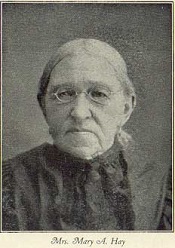 Mrs. Mary A. Hay, was born in 1825, and was a daughter of
John Rauch, of Brother’s Valley Township. Her great-grandfather, Jacob George
Rauch, came from Hagerstown, Maryland, and settled in Brother’s Valley in 1871.
He was one of the early Justices of the Peace. Her grandfather, John Rauch, was
a Veteran of the War of 1812. Her father, also John Rauch, was a farmer in
Brother’s Valley and served one term as County Commissioner.
Mrs. Mary A. Hay, was born in 1825, and was a daughter of
John Rauch, of Brother’s Valley Township. Her great-grandfather, Jacob George
Rauch, came from Hagerstown, Maryland, and settled in Brother’s Valley in 1871.
He was one of the early Justices of the Peace. Her grandfather, John Rauch, was
a Veteran of the War of 1812. Her father, also John Rauch, was a farmer in
Brother’s Valley and served one term as County Commissioner.
In 1846, Mrs. Hay united in marriage with John Boose, who died the following year. To them was born one son, John R. Boose, who resides in Somerset. In 1852 she was married to David Hay, to whom was born one son, Norman D. Hay.
Mrs. Hay was a tireless worker and was a woman of versatile mind. The fine brick House which adorns the Hay Farm was built from plans furnished by Mrs. Hay; and the garden beds as laid out by her have been preserved in the same artistic manner in which she planned them.
Mrs. Hay was reared a Lutheran, in which Church she held her membership until 1897, when she transferred it to St. Paul’s, with the work of which Church she had been closely identified for half a century. She died August 1, 1903, and was laid to rest in St. Paul’s Cemetery.
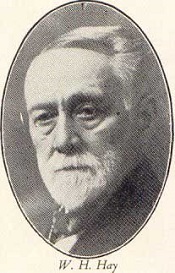 W. H. Hay, son of David and Mary (Cook) Hay, was born May
30, 1843. His mother, who was born April 30, 1824 died September 8, 1850 when
Mr. Hay was seven years old. Mr. Hay received his early training in the common
schools of Elk Lick Township, and in the Elk Lick and Meyersdale Normals. After
teaching for two years, he went to Mount Pleasant where he attended Westmoreland
Collegiate Institute.
W. H. Hay, son of David and Mary (Cook) Hay, was born May
30, 1843. His mother, who was born April 30, 1824 died September 8, 1850 when
Mr. Hay was seven years old. Mr. Hay received his early training in the common
schools of Elk Lick Township, and in the Elk Lick and Meyersdale Normals. After
teaching for two years, he went to Mount Pleasant where he attended Westmoreland
Collegiate Institute.
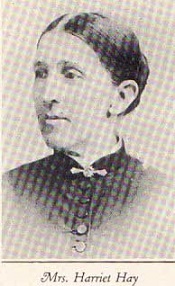 On October 17, 1865 he was married to Miss Harriett
Keim. Miss Keim was a daughter to Jonas and Sarah (Livengood) Keim and was born
February 14, 1843 and died May 30, 1904. To this union were born two sons:
Albert Leroy Grable who was born August 8, 1866 and died October 20, 1915; and
Theodore Nevin, who was born April 8, 1871 and died October 10, 1909.
On October 17, 1865 he was married to Miss Harriett
Keim. Miss Keim was a daughter to Jonas and Sarah (Livengood) Keim and was born
February 14, 1843 and died May 30, 1904. To this union were born two sons:
Albert Leroy Grable who was born August 8, 1866 and died October 20, 1915; and
Theodore Nevin, who was born April 8, 1871 and died October 10, 1909.
Mr. W. H. Hay after his marriage, located on the Beeghley Farm, now occupied by Ed R. Hay, where he lived until 1889, when he moved to Meyersdale. For a time he was engaged in the Mercantile Business and for five and one-half years was Postmaster. For twenty years he has been Squire.
Mr. Hay, has always taken a hearty interest in the affairs of the Church. He was confirmed in the first class at St. Pauls. He also enjoys the distinction of being the first Superintendent of St. Paul's Sunday School. He also served the Church as Elder and as Deacon.
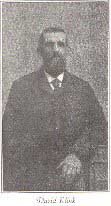 David Klink, a son of John Klink was
born in Milford Township, October 17, 1839. He was a farmer by occupation. In
1860 he was confirmed in the first class of Catechumens into the membership of
St. Paul’s. On April 15, 1861 he was married to Miss Sally Maust and to them
were born the following children: Samuel, Jonas, Eva, Catherine, Sarah, Simon
Annie, Lucy, Daniel and Amanda.
David Klink, a son of John Klink was
born in Milford Township, October 17, 1839. He was a farmer by occupation. In
1860 he was confirmed in the first class of Catechumens into the membership of
St. Paul’s. On April 15, 1861 he was married to Miss Sally Maust and to them
were born the following children: Samuel, Jonas, Eva, Catherine, Sarah, Simon
Annie, Lucy, Daniel and Amanda.
Mr. Klink died July 25, 1911 from Bright’s Disease and Rheumatism. Mrs. Klink died August 20, 1895.
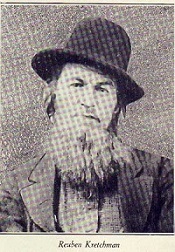 Rueben Kretchman, the oldest son of Henry and Elizabeth
(Synder) Kretchman, was born January 1, 1821, in White Hall Township, Lehigh
County, Pennsylvania.
Rueben Kretchman, the oldest son of Henry and Elizabeth
(Synder) Kretchman, was born January 1, 1821, in White Hall Township, Lehigh
County, Pennsylvania.
His father, Henry Kretchman was born in Lehigh County in 1790, and moved to Somerset County in 1822, bringing with him his wife and children and all his possessions in a wagon drawn by two horses. They crossed the Susquehanna at Harrisburg, and come through Carlisle on their was to Somerset County, where they settled on the farm now owned by J. M. Kretchman, which was taken up by a Government patent. The farm has never left the Kretchman name. Mr. Kretchman’s early trade was “Weaver”. After settling in Somerset County, he and his wife bravely went to work to hew a farm from the forest about them. His life was cut short by sustaining a rupture while rolling logs, which resulted in his death in 1833. Mrs. Kretchman died about 1854. Mr. Kretchman was Lutheran and Mrs. Kretchman was Reformed.
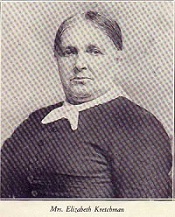 Rueben Kretchman was twelve
years old when his father died. He received his early education through
“Subscription School”. From 1839 to 1844, Mr. Kretchman taugh subscription
schools both German and English. In 1845, he was united in marriage with
Elizabeth Hostetler, Michael Hay, Justice of the Peace, performing the ceremony.
In 1853, he purchased from Daniel Hostetler a large farm in Elk Lick, now Summit
Township where he followed farming and lumbering, having one of the finest
saw-mills in the county. In all, he owned about 1,000 acres of land. Rueben
Kretchman served many years as school director, one year as assessor, and was in
his day, in ability above the average man. Early in life he united with the
Reformed Church at Elk Lick, and in 1860, assisted in the organization of St.
Paul’s, of which he became the first Elder. While Mrs. Kretchman was a Lutheran,
she was a regular attendant of the Reformed Church.
Rueben Kretchman was twelve
years old when his father died. He received his early education through
“Subscription School”. From 1839 to 1844, Mr. Kretchman taugh subscription
schools both German and English. In 1845, he was united in marriage with
Elizabeth Hostetler, Michael Hay, Justice of the Peace, performing the ceremony.
In 1853, he purchased from Daniel Hostetler a large farm in Elk Lick, now Summit
Township where he followed farming and lumbering, having one of the finest
saw-mills in the county. In all, he owned about 1,000 acres of land. Rueben
Kretchman served many years as school director, one year as assessor, and was in
his day, in ability above the average man. Early in life he united with the
Reformed Church at Elk Lick, and in 1860, assisted in the organization of St.
Paul’s, of which he became the first Elder. While Mrs. Kretchman was a Lutheran,
she was a regular attendant of the Reformed Church.
Mr. Kretchman died October 23, 1882 and was interred in the Family Lot at St. Paul, Rev. C. U. Heilman, Officiating. Mrs Kretchman died July 29, 1906 at the age of 76 years, one month and 24 days, and was laid to rest beside her husband, Rev. S. C. Stover, officiating at the funeral.
The following are the children: Mrs. Matilda Ringer, Lewis A., Mrs. Eliza. Christner, Mrs. Caroline Nicholson, Josiah, Mrs. Lydia Hay, Mrs. Mary Welfley, Nathaniel J., Samuel A., Mrs. Ida Bittner. One son, Simon Peter, died in 1861 at the age of four, and was one of the first buried in the Wilhelm Cemetery.
John Andrew Zimmerman and his wife, whose maiden name was Annie Elizabeth Breisman, were two of the five Charter Members of St. Paul’s and Mr. Zimmerman was one of the early Deacons.
Just why Mrs. Zimmerman’s name appears on the record as Mrs. Lucy Zimmerman, we are not able to say. Where her name appears on page 38 of this history, we have followed the record, but her son tells us that her name was Annie Elizabeth, and we now take occasion to say that two names refer to the same person.
John Andrew Zimmerman was born in Laurenburg, Germany, December 18, 1814. His parents were Christopher and Christena Zimmerman. John Andrew was baptized eight days after his birth. He was a Tailor by trade. Until 1854, he resided in Germany, in which year he came as an immigrant to this Country, locating in Elk Lick Township. Mrs. Zimmerman was born May 2, 1822.
Mr. and Mrs. Zimmerman were married on February 2, 1845, and they were parents of three children: Annie Mary, Henry and John Frederick.
Mr. Zimmerman died August 16, 1884 of Dropsy, Rev. C. U. Heilman officiated at his funeral. Mrs. Zimmerman died November 17, 1901 of Pneumonia, Rev. E. S. Hassler officiated at her funeral.
Garrett County MDGenWeb Copyright
Design by Templates in Time
This page was last updated
10/11/2023